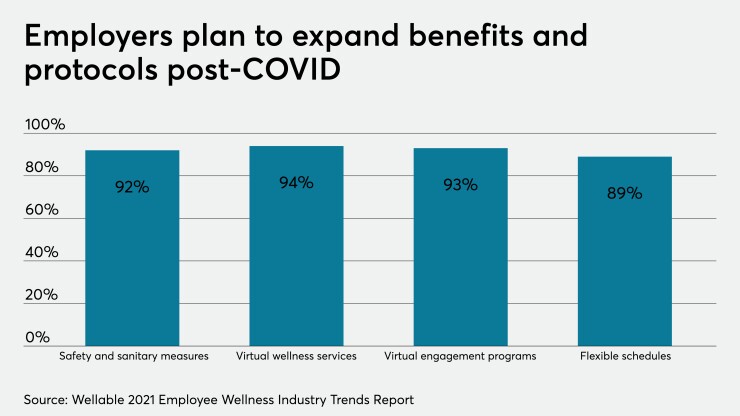Employers anticipate they’ll stick with many of the workplace changes brought on by COVID-19, from increased safety measures to virtual health and wellness benefits, once the pandemic has finally subsided.
The majority of employers plan to keep
Employers and employees have been forced to adapt to work outside of the office as COVID-19 wreaked havoc on normal life. But while
“Although it is becoming increasingly clear the world will get through this difficult time, it is also apparent that the future will not look like the past,” Brighid Courtney, director of Wellable Labs, said
Read more:
Flexibility around where and when employees work will continue to be a major trend post-COVID, with 89% of employers planning to expand flexible scheduling, according to the survey. Sixty-nine percent of employers are willing to help employees optimize their work-from-home set up with home office subsidies.
“If employees do not have the appropriate tools and equipment to fulfill their job duties, performance and productivity can suffer,” Courtney says. “These subsidies improve the work-from-home experience and therefore, the quality of work being done at home.”
Read more:
Employers plan to continue expanding their virtual benefits, relying on the ease and accessibility of telehealth, even when the pandemic comes to an end. Eighty-eight percent of employers plan to add more
Employers have consistently adjusted their benefits throughout the pandemic to help employees with mental health, caregiving, financial and well-being challenges. More than a quarter of employers have
“There has been a realization to [employers] that telemedicine is not just nice to have — it’s really an essential benefit,” says Justin Holland, CEO of HealthJoy. “Everyone is trying to get telemedicine access to their employee-base in a faster way.”
Employee benefits have strengthened the relationship between managers and employees throughout COVID and that empathy and understanding will continue to benefit the workplace well after the pandemic is over, Courtney says.
“Leadership support and understanding is critical to building a supportive work culture,” she says. “It’s not only an investment in employee well-being, but also in leadership, making managers more empathetic and approachable for their team members.”






